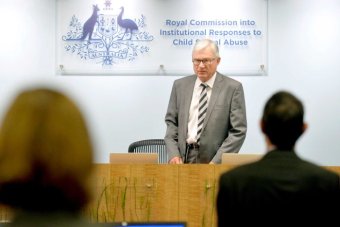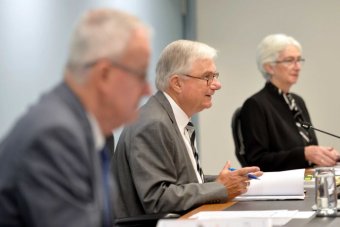Child Sexual Abuse Royal Commission: Allowing Evidence of "Bad Character" Could See More Convictions, Expert Says
By Nicole Chettle
RELATED STORY: Sexual abuse victim calls for 'group trials' to be used against offendersRELATED STORY: Sex offenders have walked free because of case handling: inquiry MAP: Sydney 2000 Changing the evidence that is admissible in Australian child sexual abuse trials could see more offenders jailed, a British academic has told a royal commission in Sydney. Professor John Spencer from Cambridge University told the Royal Commission into Institutional Responses to Child Sexual Abuse that changes to Britain's Criminal Justice Act in 2003 allowed evidence of a defendant's "bad character" to be admitted in criminal trials. Professor Spencer appeared before the commission, which is examining how the criminal justice system handles allegations of sexual abuse, via video link and said the government introduced the measure thinking it would increase the conviction rate. "I don't think it has produced any dramatic increase in the conviction rate," Professor Spencer said. "I think the reason is that juries usually have the sense to see that evidence of bad character is in most cases only a peripheral piece of evidence. "And they're more inclined to pay attention to the central parts of the evidence." Earlier this week, the commission heard group trials would result in more convictions for child sexual assault offenders and offenders had walked free because of the way cases were handled. The royal commission has examined several other case studies, including child sexual abuse in the Catholic Church, the Salvation Army and at music and dance schools. Judges won't be 'overanxious' if evidence relevant: expert Today, Professor Spencer was asked to focus on child sexual assault cases in Australia and whether more convictions would be likely if evidence of bad character was admissible in this type of matter. "Yes. Maybe not as 'more likely' as the proponents of our 2003 reform thought. But certainly and fairly obviously, yes - more likely," he said. Professor Spencer said early critics of the British reform described it as "hawkish", but "the new generation of judges ... are basically content with the reform and wouldn't be overanxious to exclude the evidence if they thought it was genuinely relevant".
He also said the United Kingdom might have underestimated the ability of jurors to fairly handle such evidence. "It seems to me we've been schizophrenic in our attitudes to juries," he said. "We've praised juries as this wonderful gift of the common law to the civilised world, the 'lamp by which we know that freedom lives' as Lord Devon called it. "If we say that, we can't then say: 'but actually we're dealing with such a bunch of prosecution-minded cretins that we can't let them hear pieces of only slightly relevant evidence'." Commissioner Justice Peter McClellan told Professor Spencer: "the thoughts you have and the work you've done is of particular significance as we seek to gather different views about the current state of the law in Australia." "And whether or not the royal commission should recommend consideration be given to changes," Justice McClellan said. The hearing continues.
|
.
Any original material on these pages is copyright © BishopAccountability.org 2004. Reproduce freely with attribution.

